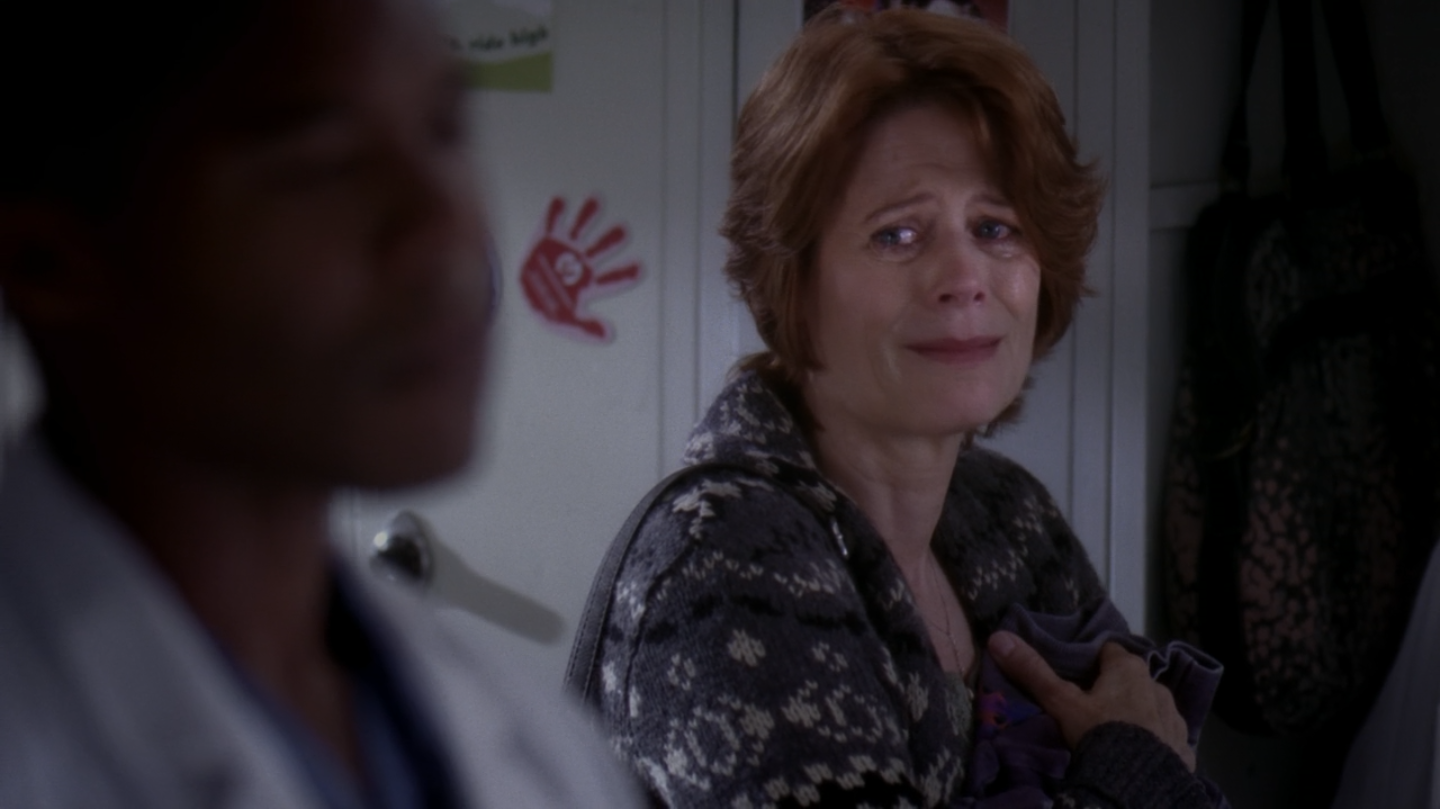The Shocking Truth: What Happens To Brooks In Grey's Anatomy?
For fans of Grey's Anatomy, the question of what happens to Brooks in Grey's Anatomy often brings a wave of melancholy, recalling one of the series' most abrupt and tragic character exits. Dr. Heather Brooks, portrayed by Tina Majorino, was a bright, quirky, and promising surgical intern whose journey at Grey Sloan Memorial Hospital was cut tragically short, leaving a significant void and impacting the lives of her mentors and peers. Her sudden departure served as a stark reminder of the unpredictable nature of life and death within the high-stakes world of Seattle Grace (now Grey Sloan Memorial).
The medical drama, known for its rollercoaster of emotions and unexpected plot twists, has never shied away from confronting the harsh realities of mortality. Brooks' story is a poignant example of how quickly circumstances can change, illustrating that even the most promising careers and lives can be extinguished in an instant. Understanding the full scope of her fate requires delving into the events that led to her untimely demise and the lasting repercussions her death had on the beloved characters of the show.
Table of Contents
- Who Was Dr. Heather Brooks? A Brief Profile
- The Meaning of "Happening" in Grey's Anatomy's Context
- The Fateful Storm: How It All Unfolded
- The Immediate Aftermath: The Fight for Brooks' Life
- The Ripple Effect: What Happens to Brooks' Legacy in Grey's Anatomy
- Why Her? The Narrative Purpose of Brooks' Exit
- Fan Reactions and Lasting Impressions
- Beyond the Screen: Reflecting on Loss in Fictional Worlds
Who Was Dr. Heather Brooks? A Brief Profile
Dr. Heather Brooks was introduced in Season 9 as one of the new batch of surgical interns, alongside Shane Ross, Stephanie Edwards, Jo Wilson, and Leah Murphy. Right from the start, Brooks distinguished herself with her quirky personality, her intense enthusiasm, and a somewhat awkward but endearing social demeanor. She quickly became known for her intelligence and her particular affinity for neurosurgery, catching the eye of none other than Dr. Derek Shepherd, the hospital's renowned neurosurgeon.
- Father Knows Best Cast
- How Old Is Marie Osmond
- How Much Does Tom Selleck Make On Blue Bloods
- Cast In Csi
- Vanna White Salary
Her dedication and unique perspective made her a standout among her peers. She was often seen as Derek's "mini-me," demonstrating a natural aptitude for the intricate complexities of the brain. This mentorship was a significant part of her storyline, promising a bright future in a highly competitive field. Her character brought a fresh, often humorous, energy to the intern class, and viewers quickly grew fond of her.
Here's a quick overview of Dr. Heather Brooks:
| Attribute | Detail |
|---|---|
| Full Name | Dr. Heather Brooks |
| Portrayed By | Tina Majorino |
| Role | Surgical Intern |
| Seasons Appeared | Season 9, Season 10 (briefly) |
| Key Traits | Quirky, intelligent, enthusiastic, socially awkward, dedicated, keen interest in neurosurgery. |
| Mentor | Dr. Derek Shepherd |
| Fate | Died from electrocution and subsequent complications during a superstorm. |
The Meaning of "Happening" in Grey's Anatomy's Context
When we ask "what happens to Brooks in Grey's Anatomy," we are fundamentally asking about the events that transpired, the sequence of occurrences that led to her tragic end. The word "happen" itself carries the weight of unplanned events, of things coming to pass without prior design. As the definition suggests, "happen means to occur, to come to pass by chance, or to befall someone or something." In Brooks' case, her death was precisely that: an occurrence, an event that took place unexpectedly, without being planned, and certainly without her foresight or control. It was a cruel twist of fate, a chance encounter with danger that ultimately sealed her destiny.
- Jodie Sweetin In Bikini
- Rocky Casting
- Television Shows From The 1970s
- Leave It Beaver Cast
- Fred Gwynne As Herman Munster
Grey's Anatomy often leverages this unpredictability. Characters face unforeseen medical crises, accidents, and natural disasters that dramatically alter their lives. Brooks' death perfectly embodies the essence of "happen" in its most stark and unforgiving form. It wasn't a planned surgical error or a long-term illness; it was a sudden, catastrophic event that simply *happened* to her, in the wrong place, at the wrong time. This element of chance makes her death particularly jarring and impactful, both for the characters within the show and for the audience watching from home.
The Fateful Storm: How It All Unfolded
The events leading to what happens to Brooks in Grey's Anatomy are set against the backdrop of one of the show's most dramatic and destructive natural disasters: a massive superstorm that wreaked havoc on Seattle and, more specifically, on Grey Sloan Memorial Hospital.
The Superstorm and Its Chaos
The superstorm hit Seattle in the Season 9 finale, "Perfect Storm," and its devastating aftermath continued into the Season 10 premiere, "Seal Our Fate" and "I Want You With Me." The hospital was plunged into chaos. Power outages were rampant, emergency generators struggled, and the sheer volume of injured patients overwhelmed the staff. The storm's fury was not just external; it mirrored the internal turmoil and high-stakes medical emergencies unfolding within the hospital's walls. Flooding, electrical failures, and structural damage turned the familiar corridors into a perilous environment. This chaotic setting was the unfortunate stage for Brooks' final moments.
Brooks' Tragic Discovery
During the height of the storm, Dr. Richard Webber, the former Chief of Surgery, was in the hospital's basement, attempting to restore power to a crucial area. Unbeknownst to anyone, he suffered an electrocution and collapsed, leaving him unconscious and in grave danger. It was Dr. Heather Brooks who, while searching for Richard, stumbled upon the horrific scene. In her frantic attempt to help him, she inadvertently stepped into a puddle of water that had been electrified by exposed wiring. The resulting electrical shock sent her flying backward, hitting her head with immense force. This head trauma, coupled with the electrocution itself, initiated a cascade of neurological damage that would prove fatal. Her discovery of Richard was an act of compassion, but it tragically led to her own demise, intertwining their fates in a devastating way.
The Immediate Aftermath: The Fight for Brooks' Life
Following her electrocution and severe head injury, Brooks was discovered by Shane Ross, her fellow intern. The scene was dire. She was unconscious, and her neurological state was rapidly deteriorating. Dr. Derek Shepherd, her mentor and the chief of neurosurgery, took charge of her case with a desperate urgency. He felt a profound personal responsibility for Brooks, viewing her as a promising protégé, almost like a younger sister in the surgical family.
The medical team, led by Derek, worked tirelessly and frantically to save her. They performed a craniotomy to relieve the swelling in her brain, a complex and delicate procedure made even more challenging by the ongoing storm and the hospital's compromised conditions. Every effort was made to stabilize her and reverse the damage. However, the initial impact of the electrocution combined with the severe head trauma had caused irreversible damage. Despite Derek's unparalleled surgical skills and the team's desperate attempts, Brooks' brain activity continued to decline. The damage was too extensive, too profound. In a heartbreaking moment, Derek, with his own hands, had to declare his promising intern brain dead. The fight for Brooks' life was swift and brutal, ending in a devastating loss that left the entire surgical team reeling.
The Ripple Effect: What Happens to Brooks' Legacy in Grey's Anatomy
The death of Dr. Heather Brooks was not just a tragic isolated incident; it sent powerful ripples throughout Grey Sloan Memorial Hospital, profoundly affecting several key characters and storylines. Her passing became a catalyst for significant emotional and professional developments, particularly for those closest to her.
For Dr. Derek Shepherd, the impact was immense. He carried the heavy burden of guilt, feeling responsible for not being able to save his bright protégé. This guilt manifested in his decision to briefly step away from surgery, taking on a research project for the White House, a path that would eventually lead him away from Seattle and to his own tragic end. Brooks' death highlighted the immense pressure and emotional toll that surgeons face when they lose a patient, especially one they have personally invested in.
The other interns – Shane Ross, Stephanie Edwards, Jo Wilson, and Leah Murphy – were also deeply affected. Brooks was one of their own, a peer with whom they shared the arduous journey of residency. Her death served as a harsh wake-up call to the fragility of life and the inherent dangers of their profession. Shane Ross, in particular, struggled with the aftermath, leading to increasingly reckless and arrogant behavior in the operating room as he tried to cope with his grief and the guilt of being the one who found her. This grief and the subsequent guilt became a major arc for his character, ultimately leading to his departure from the hospital.
Her death also underscored the theme that death is, as some ancient texts describe it, "the last enemy" that will be destroyed. While the show doesn't delve into the philosophical or religious aspects of "what happens to the soul at death," it vividly portrays the very human struggle against mortality and the profound grief that remains for those left behind. Brooks' absence created a palpable void, reminding everyone of the ever-present threat of loss in their high-stakes lives. Her legacy, though brief, was one of a bright spirit extinguished too soon, leaving a lasting mark on the hospital's collective memory and the individual journeys of her friends and mentors.
Why Her? The Narrative Purpose of Brooks' Exit
Grey's Anatomy has a long history of killing off beloved characters, often abruptly and unexpectedly. From George O'Malley to Lexie Grey and Mark Sloan, the show has consistently used death as a powerful narrative device to shock viewers, raise the stakes, and propel other characters' storylines forward. The question of "why Heather Brooks?" is a valid one, and her death served several key narrative purposes.
Firstly, her death was a stark demonstration of the inherent dangers of working in a hospital, especially during a crisis. It highlighted that even the most promising and innocent characters are not immune to the perils that can arise within the medical environment. It underscored the show's commitment to portraying the raw, unpredictable nature of life and death in a hospital setting, reinforcing the idea that tragedy can strike anyone, at any time.
Secondly, Brooks' death provided significant emotional fodder for the surviving characters, particularly Derek Shepherd and Shane Ross. For Derek, it was a profound personal and professional blow that led to introspection and a change in his career path. For Shane, it was a crucible that exposed his vulnerabilities and set him on a destructive trajectory, ultimately leading to his departure from the show. Her death was not just an end to her story, but a powerful beginning for new arcs for others.
Thirdly, it cemented the bond and shared trauma among the remaining interns. Losing one of their own so early in their careers forged a deeper, more somber connection between Jo, Stephanie, and Leah, reminding them of the gravity of their chosen profession and the support they needed from one another. In essence, what happens to Brooks in Grey's Anatomy served as a narrative pivot point, a dramatic event designed to elicit strong emotional responses and drive character development in the wake of immense loss.
Fan Reactions and Lasting Impressions
The death of Dr. Heather Brooks elicited a strong reaction from the Grey's Anatomy fanbase. While she wasn't a long-standing core character like some of the others who met untimely ends, her quirky charm and potential had quickly endeared her to many viewers. Her death was widely regarded as shocking and deeply sad, precisely because it was so sudden and unexpected, mirroring the random cruelty of real-life accidents.
Fans often expressed their sorrow on social media, lamenting the loss of a character who seemed to have so much promise. Many felt that her storyline was cut short prematurely, leaving a sense of "what if" regarding her potential contributions to neurosurgery and her relationships with other characters. Her death also sparked discussions about the show's tendency to kill off characters, with some viewers expressing frustration at the emotional toll these plot twists took.
Despite her relatively brief tenure, Brooks holds a memorable, albeit tragic, place in the pantheon of Grey's Anatomy's departed characters. She represents the vulnerability of new beginnings in a world fraught with peril. Her story is a poignant reminder of the show's ability to create genuine emotional investment in its characters, even those who are only on screen for a short time, making the question of what happens to Brooks in Grey's Anatomy a lingering and impactful one for the audience.
Beyond the Screen: Reflecting on Loss in Fictional Worlds
The tragic fate of Dr. Heather Brooks, like many other character deaths in Grey's Anatomy, resonates deeply with viewers because it taps into universal human experiences of loss and grief. While we are discussing a fictional character, the emotions evoked by her death are very real. The show, through its portrayal of how characters cope with such profound losses, implicitly touches upon the broader questions humanity has grappled with for millennia: "what happens to the dead," and "what happens to the soul at death."
Though Grey's Anatomy is a medical drama, not a philosophical treatise, it constantly confronts the boundary between life and death. The characters, as medical professionals, are intimately familiar with the physical cessation of life, yet they, like all of us, are left to grapple with the emotional and existential void that follows. The diverse reactions of the characters to Brooks' death—from Derek's guilt to Shane's self-destructive behavior and the interns' shared grief—reflect the myriad ways individuals process the reality of mortality. As the "Data Kalimat" notes, "answers to the question about what happens when we die are as diverse as the customs and beliefs of the people giving them." While the show doesn't provide religious answers, it showcases the human condition of grappling with the finality of death and the enduring impact it has on the living.
Fictional narratives like Grey's Anatomy serve as a safe space for us to explore these complex emotions and existential questions. Brooks' death, a sudden and arbitrary occurrence, forces both the characters and the audience to confront the fragility of life and the often-unforeseen circumstances that can lead to its end. It reminds us that "something that happens occurs or is done without being planned," and that sometimes, despite all medical advancements and human effort, "we cannot say for sure what will happen." Her story, therefore, is not just about a character's demise; it's a reflection on the universal experience of loss and the enduring questions it leaves in its wake.
Conclusion
The question of what happens to Brooks in Grey's Anatomy leads us to one of the series' most heartbreaking and impactful character deaths. Dr. Heather Brooks, a bright and promising intern, met a tragic and untimely end during a devastating superstorm, dying from electrocution and severe head trauma while trying to help Dr. Richard Webber. Her death was a shocking event that profoundly affected Derek Shepherd, Shane Ross, and the entire intern class, serving as a stark reminder of the unpredictable nature of life and the high stakes of their profession.
Brooks' brief but memorable presence left a lasting impression, and her sudden departure underscored Grey's Anatomy's willingness to confront the harsh realities of mortality. Her story, though short, was a powerful narrative device that propelled other characters' arcs and deepened the emotional landscape of the show. While her light was extinguished too soon, the ripples of her passing continued to be felt, shaping the journeys of those she left behind.
What are your memories of Dr. Heather Brooks? Did her death surprise you, or did you anticipate the show's capacity for such sudden tragedies? Share your thoughts and reflections on her character and the impact of her storyline in the comments below!
- Revenge Of The Nerds Cast
- Cast In Csi
- Sjp Young
- Catherine Zeta Jones Young
- House Of Night Series Order

Watch Grey's Anatomy | Full Episodes | Disney+

Maura Brooks | Grey's Anatomy and Private Practice Wiki | Fandom

Heather Brooks' Grey's Anatomy Death: Why She Was Killed Off & Why Fans